高中英语必修一第四单元阅读
- 格式:pptx
- 大小:1.94 MB
- 文档页数:14
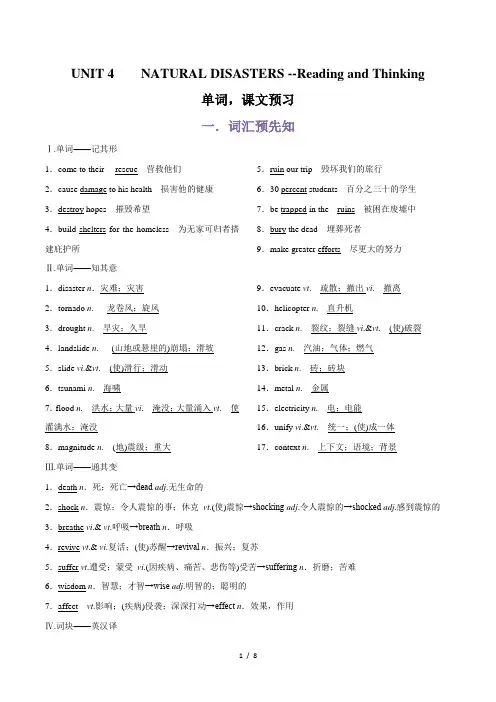
UNIT 4 NATURAL DISASTERS --Reading and Thinking单词,课文预习一.词汇预先知Ⅰ.单词——记其形1.come to their __rescue营救他们2.cause damage to his health 损害他的健康3.destroy hopes 摧毁希望4.build shelters for the homeless 为无家可归者搭建庇护所5.ruin our trip 毁坏我们的旅行6.30 percent students 百分之三十的学生7.be trapped in the__ruins 被困在废墟中8.bury the dead 埋葬死者9.make greater efforts 尽更大的努力Ⅱ.单词——知其意1.disaster n.灾难;灾害2.tornado n. 龙卷风;旋风3.drought n. 旱灾;久旱4.landslide n. (山地或悬崖的)崩塌;滑坡5.slide vi.&vt. (使)滑行;滑动6.tsunami n. 海啸7.flood n. 洪水;大量vi. 淹没;大量涌入vt. 使灌满水;淹没8.magnitude n. (地)震级;重大9.evacuate vt. 疏散;撤出vi. 撤离10.helicopter n. 直升机11.crack n. 裂纹;裂缝vi.&vt. (使)破裂12.gas n. 汽油;气体;燃气13.brick n. 砖;砖块14.metal n. 金属15.electricity n. 电;电能16.unify vi.&vt. 统一;(使)成一体17.context n. 上下文;语境;背景Ⅲ.单词——通其变1.death n.死;死亡→dead adj.无生命的2.shock n.震惊;令人震惊的事;休克vt.(使)震惊→shocking adj.令人震惊的→shocked adj.感到震惊的3.breathe vi.& vt.呼吸→breath n.呼吸4.revive vt.& vi.复活;(使)苏醒→revival n.振兴;复苏5.suffer vt.遭受;蒙受vi.(因疾病、痛苦、悲伤等)受苦→suffering n.折磨;苦难6.wisdom n.智慧;才智→wise adj.明智的;聪明的7.affect__vt.影响;(疾病)侵袭;深深打动→effect n.效果,作用Ⅳ.词块——英汉译1.as if 似乎;好像;仿佛2.in ruins 严重受损;破败不堪3.in shock 震惊;吃惊4.set up 建立5.as usual 像往常一样6.come to an end 结束7.the number of ……的数量8.dig out 挖掘9.a home to ……的家园10.go through 经历11.be gone 没有了12.provide medical care 提供医疗服务二.课文精研读原文呈现THE NIGHT THE EARTHDIDN’T SLEEPStrange things were happening in the countryside of northeastern①Hebei.For several days, the water in the village wells② rose③ and fell,rose and fell.There were deep cracks that appeared in the well walls.At least one well had some smelly④ gas coming out of it【1】.Chickens and even pigs were too nervous to eat【2】,and dogs refused to go inside buildings.Mice ran out of the fields looking for places to hide【3】,and fish jumped out of the water.At about 3:00 a.m., on 28 July 1976, bright lights were seen in the sky outside the city of Tangshan and loud noises were heard.But the city’s one million people were asleep⑤ as usual⑥ that night.【1】“coming out of it”在此为现在分词短语作后置定语,修饰gas。
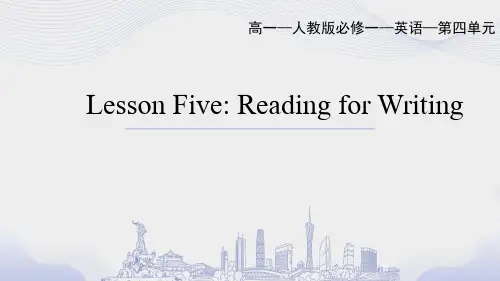
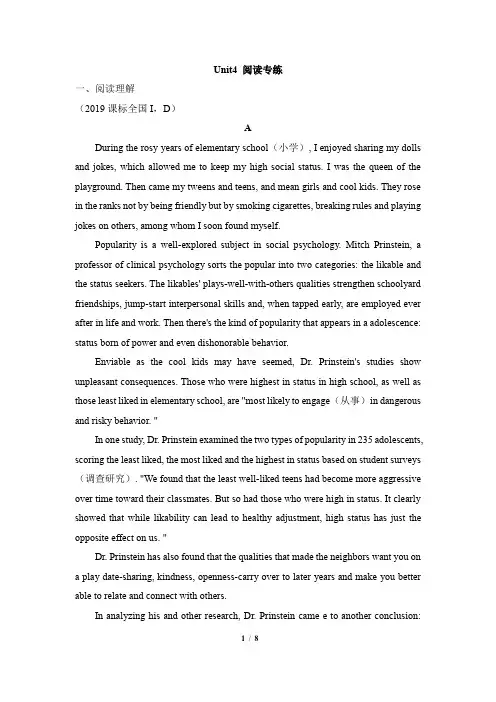
Unit4 阅读专练一、阅读理解(2019课标全国I,D)ADuring the rosy years of elementary school(小学), I enjoyed sharing my dolls and jokes, which allowed me to keep my high social status. I was the queen of the playground. Then came my tweens and teens, and mean girls and cool kids. They rose in the ranks not by being friendly but by smoking cigarettes, breaking rules and playing jokes on others, among whom I soon found myself.Popularity is a well-explored subject in social psychology. Mitch Prinstein, a professor of clinical psychology sorts the popular into two categories: the likable and the status seekers. The likables' plays-well-with-others qualities strengthen schoolyard friendships, jump-start interpersonal skills and, when tapped early, are employed ever after in life and work. Then there's the kind of popularity that appears in a adolescence: status born of power and even dishonorable behavior.Enviable as the cool kids may have seemed, Dr. Prinstein's studies show unpleasant consequences. Those who were highest in status in high school, as well as those least liked in elementary school, are "most likely to engage(从事)in dangerous and risky behavior. "In one study, Dr. Prinstein examined the two types of popularity in 235 adolescents, scoring the least liked, the most liked and the highest in status based on student surveys (调查研究). "We found that the least well-liked teens had become more aggressive over time toward their classmates. But so had those who were high in status. It clearly showed that while likability can lead to healthy adjustment, high status has just the opposite effect on us. "Dr. Prinstein has also found that the qualities that made the neighbors want you on a play date-sharing, kindness, openness-carry over to later years and make you better able to relate and connect with others.In analyzing his and other research, Dr. Prinstein came e to another conclusion:Not only is likability related to positive life outcomes, but it is also responsible for those outcomes, too. "Being liked creates opportunities for learning and for new kinds of life experiences that help somebody gain an advantage," he said.1. What sort of girl was the author in her early years of elementary school?A. Unkind.B. Lonely.C. Generous.D. Cool.2. What is the second paragraph mainly about?A. The classification of the popular.B. The characteristics of adolescents.C. The importance of interpersonal skills.D. The causes of dishonorable behavior.3. What did Dr. Prinstein's study find about the most liked kids?A. They appeared to be aggressive.B. They tended to be more adaptable.C. They enjoyed the highest status.D. They performed well academically.4. What is the best title for the text?A. Be Nice-You Won't Finish LastB. The Higher the Status, the BetterC. Be the Best-You Can Make ItD. More Self-Control, Less AggressivenessB(2017课标全国Ⅱ,B)I first met Paul Newman in 1968, when George Roy Hill, the director of Butch Cassidy and the Sundance Kid, introduced us in New York City. When the studio didn't want me for the film-it wanted somebody as well known as Paul-he stood up for me. I don't know how many people would have done that; they would have listened to theiragents or the studio powers.The friendship that grew out of the experience of making that film and The Sting four years later had its root in the fact that although there was an age difference, we both came from a tradition of theater and live TV. We were respectful of craft(技艺)and focused on digging into the characters we were going to play. Both of us had the qualities and virtues that are typical of American actors: humorous, aggressive, and making fun of each other-but always with an underlying affection. Those were also at the core(核心)of our relationship off the screen.We shared the belief that if you' re fortunate enough to have success, you should put something back-he with his Newman's Own food and his Hole in the Wall camps for kids who are seriously ill, and me with Sundance and the institute and the festival. Paul and I didn't see each other all that regularly, but sharing that brought us together. We supported each other financially and by showing up at events.I last saw him a few months ago. He'd been in and out of the hospital. He and I both knew what the deal was, and we didn't talk about it. Ours was a relationship that didn't need a lot of words.5. Why was the studio unwilling to give the role to the author at first?A. Paul Newman wanted it.B. The studio powers didn't like his agent.C. He wasn't famous enough.D. The director recommended someone else.6. Why did Paul and the author have a lasting friendship?A. They were of the same age.B. They worked in the same theater.C. They were both good actors.D. They had similar characteristics.7. What does the underlined word "that" in paragraph 3 refer to?A. Their belief.B. Their care for children.C. Their success.D. Their support for each other.8. What is the author's purpose in writing the text?A. To show his love of films.B. To remember a friend.C. To introduce a new movie.D. To share his acting experience.二、七选五(2020浙江)I experienced years of loneliness as a child. 1 His friends teased him about babysitting his sister and his interests were far different from mine. With no other kids of my age in the neighborhood, I had to spend hours by myself.A bright spot for me turned out to be reading. My love of the written word began early as my mother read to me every evening. 2 I started reading books on my own before age 5 and my mother took me to the public library once a week to borrow several books. I quickly graduated from typical children's books to ones with fewer pictures and longer chapters. Reading opened new worlds to me. 3My mother also encouraged me to make what I wanted. I tried making toy cars with cardboard boxes and constructing buildings from leftover cardboard and bits of wood my father gave me. When my mother saw my creations, she told me how creative my designs were. 4 I learned a lot about how to extend the life of objects and transform them into something new and useful. It was a trait(特点)others found helpful, and I soon had friends who wanted to make things with me.5 My parents made it a point for their two kids to spend time outside, no matter the weather or season. My brother, of course, raced off to be with his friends, while I had plenty to do myself. There was making leaf houses in autumn, ice skating in winter, and so much more. They' re all memories treasure today.A. I wasn't alone any longer.B. I enjoyed reading stories aloud.C. I was invited to play with another kid.D. I loved the colorful photographs in the books.E. Another habit I formed early was being outdoors.F. Thus, I began my lifelong interest in making things.G. My older brother couldn't be bothered to play with me.1. ________2. ________3. ________4. ________5. ________参考答案:一、阅读理解A语篇解读:本文体裁为说明文,主题语境为人与社会,主题语境内容为社会交往。
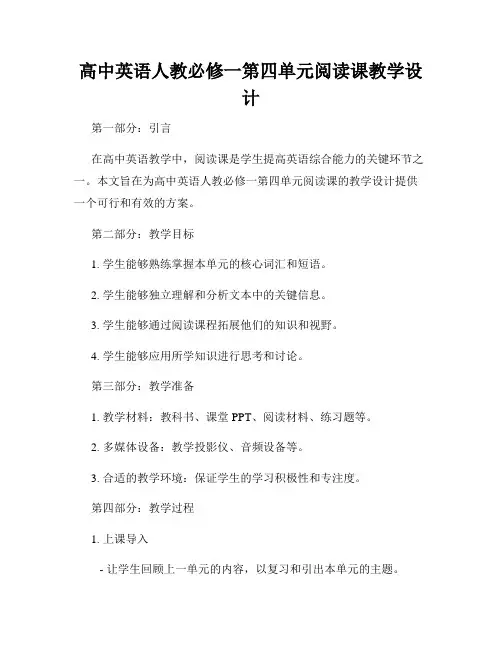
高中英语人教必修一第四单元阅读课教学设计第一部分:引言在高中英语教学中,阅读课是学生提高英语综合能力的关键环节之一。
本文旨在为高中英语人教必修一第四单元阅读课的教学设计提供一个可行和有效的方案。
第二部分:教学目标1. 学生能够熟练掌握本单元的核心词汇和短语。
2. 学生能够独立理解和分析文本中的关键信息。
3. 学生能够通过阅读课程拓展他们的知识和视野。
4. 学生能够应用所学知识进行思考和讨论。
第三部分:教学准备1. 教学材料:教科书、课堂PPT、阅读材料、练习题等。
2. 多媒体设备:教学投影仪、音频设备等。
3. 合适的教学环境:保证学生的学习积极性和专注度。
第四部分:教学过程1. 上课导入- 让学生回顾上一单元的内容,以复习和引出本单元的主题。
- 引入本单元的主题,激发学生的学习兴趣。
2. 预习任务- 学生在课前阅读教科书中的相关阅读材料,了解文章的大意和关键内容。
- 学生可以在教室中小组讨论或写下一到两个问题。
3. 教师示范- 教师用板书或PPT展示关键词汇和短语,并解释其意义和用法。
- 教师带领学生朗读和理解文本中的关键句子和段落。
4. 学生合作活动- 学生以小组形式讨论和分享他们的预习问题,教师引导他们扩展思维和观点。
- 学生可以进行角色扮演或小组演示,以提高他们的口语表达能力。
5. 阅读理解- 学生阅读教科书中的阅读材料,并回答与之相关的问题。
- 教师可进行个别辅导,帮助学生理解和解决阅读中的困惑。
6. 扩展活动- 教师可安排一些扩展活动,如观看相关视频、听取相关音频或阅读相关文章。
- 学生可以进行小组讨论或写下他们的观点和反思。
7. 总结评价- 教师对学生的表现进行评价和总结,鼓励他们的努力和进步。
- 学生可以自评和互评,以促进他们的学习动力和自我反思。
第五部分:作业布置1. 学生可完成课后阅读和练习题,巩固对本单元内容的理解和掌握。
2. 学生可撰写一篇关于本单元主题的小作文,以提高他们的写作能力。
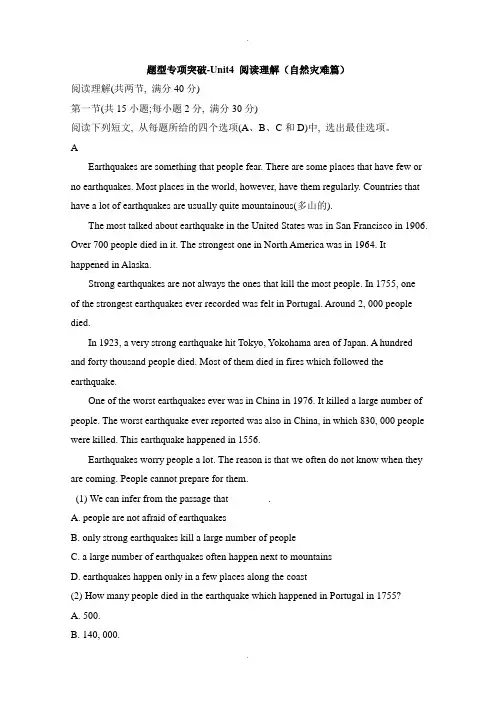
题型专项突破-Unit4 阅读理解(自然灾难篇)阅读理解(共两节, 满分40分)第一节(共15小题;每小题2分, 满分30分)阅读下列短文, 从每题所给的四个选项(A、B、C和D)中, 选出最佳选项。
AEarthquakes are something that people fear. There are some places that have few or no earthquakes. Most places in the world, however, have them regularly. Countries that have a lot of earthquakes are usually quite mountainous(多山的).The most talked about earthquake in the United States was in San Francisco in 1906. Over 700 people died in it. The strongest one in North America was in 1964. It happened in Alaska.Strong earthquakes are not always the ones that kill the most people. In 1755, oneof the strongest earthquakes ever recorded was felt in Portugal. Around 2, 000 people died.In 1923, a very strong earthquake hit Tokyo, Yokohama area of Japan. A hundred and forty thousand people died. Most of them died in fires which followed the earthquake.One of the worst earthquakes ever was in China in 1976. It killed a large number of people. The worst earthquake ever reported was also in China, in which 830, 000 people were killed. This earthquake happened in 1556.Earthquakes worry people a lot. The reason is that we often do not know when they are coming. People cannot prepare for them.(1) We can infer from the passage that________.A. people are not afraid of earthquakesB. only strong earthquakes kill a large number of peopleC. a large number of earthquakes often happen next to mountainsD. earthquakes happen only in a few places along the coast(2) How many people died in the earthquake which happened in Portugal in 1755?A. 500.B. 140, 000.C. 830, 000.D. About 2, 000.(3) When and where was the worst earthquake ever reported?A. 1964;Alaska.B. 1556;China.C. 1923;Japan.D. 1979;China.(4) According to the passage, which of the following is NOT true?A. The stronger the earthquake is, the more people are killed.B. Earthquakes often come unexpectedly.C. Earthquakes can cause fires.D. People still don’t know when an earthquake will come.答案:(1)-(4) C D B A解析:(1) 细节理解题。
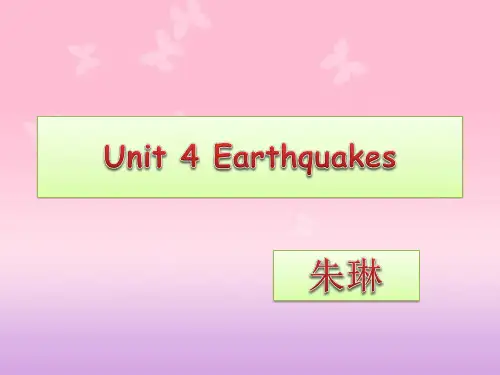
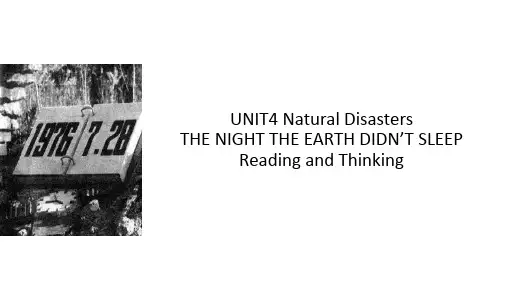
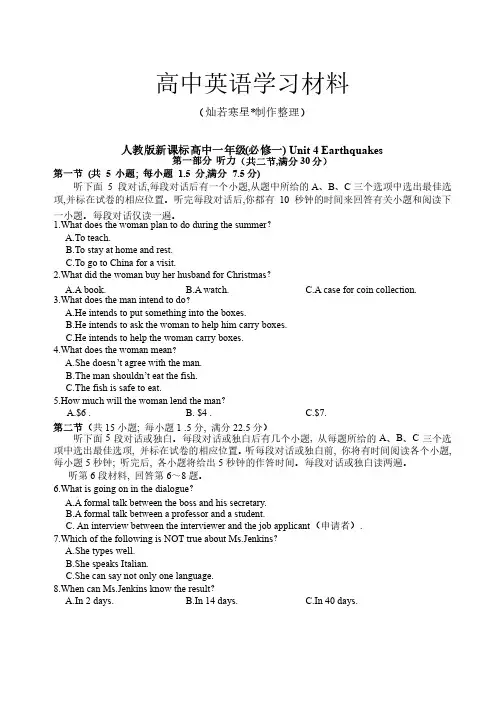
高中英语学习材料(灿若寒星*制作整理)人教版新课标高中一年级(必修一) Unit 4 Earthquakes 第一部分 听力(共二节,满分30分) 第一节 (共 5 小题; 每小题 1.5 分,满分 7.5分)听下面听下面5 段对话,每段对话后有一个小题,从题中所给的A 、B 、C 三个选项中选出最佳选项,并标在试卷的相应位置。
听完每段对话后,你都有你都有10 秒钟的时间来回答有关小题和阅读下一小题。
每段对话仅读一遍。
一小题。
每段对话仅读一遍。
1.What does the woman plan to do during the summerA.To teach.B.To stay at home and rest.C.To go to China for a visit. 2.What did the woman buy her husband for Christmas ?A.A book.B.A watch.C.A case for coin collection. 3.What does the man intend to doA.He intends to put something into the boxes.B.He intends to ask the woman to help him carry boxes.C.He intends to help the woman carry boxes. 4.What does the woman mean ?A.She doesn A.She doesn’’t agree with the man.B.The man shouldn B.The man shouldn’’t eat the fish.C.The fish is safe to eat. 5.How much will the woman lend the man ?A.$6 .B. $4 .C.$7. 第二节(共15小题; 每小题1 .5分, 满分22.5分)分) 听下面5段对话或独白。
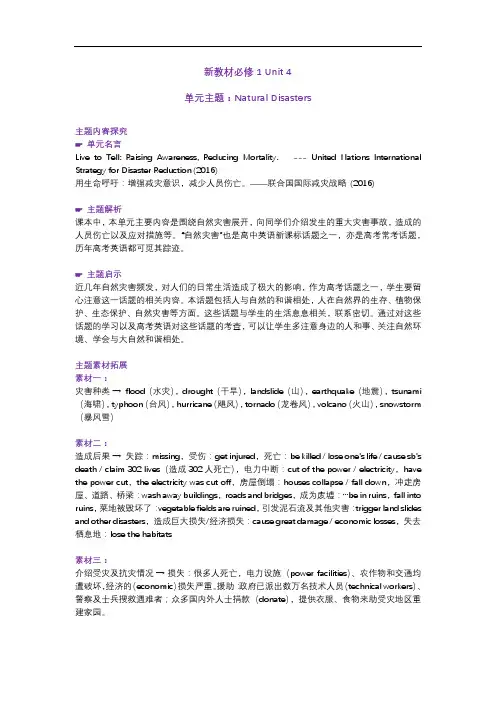
新教材必修1 Unit 4单元主题:Natural Disasters主题内容探究☛单元名言Live to Tell: Raising Awareness, Reducing Mortality. --- United Nations International Strategy for Disaster Reduction (2016)用生命呼吁:增强减灾意识,减少人员伤亡。
——联合国国际减灾战略(2016)☛主题解析课本中,本单元主要内容是围绕自然灾害展开,向同学们介绍发生的重大灾害事故,造成的人员伤亡以及应对措施等。
“自然灾害”也是高中英语新课标话题之一,亦是高考常考话题,历年高考英语都可觅其踪迹。
☛主题启示近几年自然灾害频发,对人们的日常生活造成了极大的影响,作为高考话题之一,学生要留心注意这一话题的相关内容。
本话题包括人与自然的和谐相处,人在自然界的生存、植物保护、生态保护、自然灾害等方面。
这些话题与学生的生活息息相关,联系密切。
通过对这些话题的学习以及高考英语对这些话题的考查,可以让学生多注意身边的人和事、关注自然环境、学会与大自然和谐相处。
主题素材拓展素材一:灾害种类→flood(水灾),drought(干旱),landslide(山),earthquake(地震),tsunami (海啸),typhoon(台风),hurricane(飓风),tornado(龙卷风),volcano(火山),snowstorm (暴风雪)素材二:造成后果→失踪:missing,受伤:get injured,死亡:be killed / lose one's life / cause sb's death / claim 302 lives(造成302人死亡),电力中断:cut of the power / electricity,have the power cut,the electricity was cut off,房屋倒塌:houses collapse / fall down,冲走房屋、道路、桥梁:wash away buildings,roads and bridges,成为废墟:…be in ruins,fall into ruins,菜地被毁坏了:vegetable fields are ruined,引发泥石流及其他灾害:trigger land slides and other disasters,造成巨大损失/经济损失:cause great damage / economic losses,失去栖息地:lose the habitats素材三:介绍受灾及抗灾情况→损失:很多人死亡,电力设施(power facilities)、农作物和交通均遭破坏,经济的(economic)损失严重。
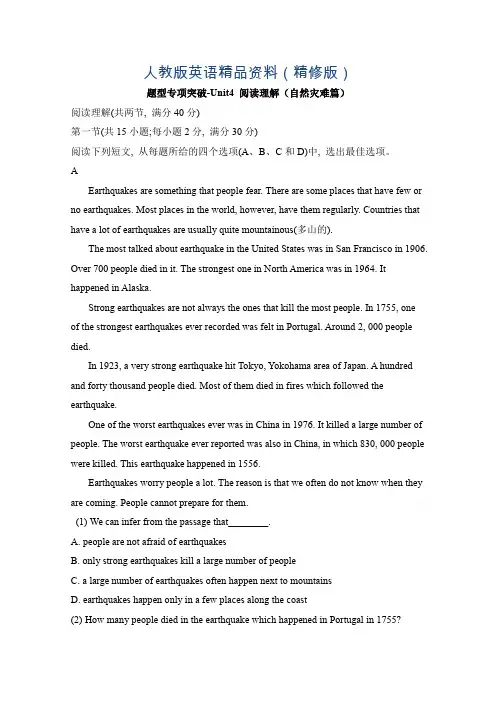
人教版英语精品资料(精修版)题型专项突破-Unit4 阅读理解(自然灾难篇)阅读理解(共两节, 满分40分)第一节(共15小题;每小题2分, 满分30分)阅读下列短文, 从每题所给的四个选项(A、B、C和D)中, 选出最佳选项。
AEarthquakes are something that people fear. There are some places that have few or no earthquakes. Most places in the world, however, have them regularly. Countries that have a lot of earthquakes are usually quite mountainous(多山的).The most talked about earthquake in the United States was in San Francisco in 1906. Over 700 people died in it. The strongest one in North America was in 1964. It happened in Alaska.Strong earthquakes are not always the ones that kill the most people. In 1755, oneof the strongest earthquakes ever recorded was felt in Portugal. Around 2, 000 people died.In 1923, a very strong earthquake hit Tokyo, Yokohama area of Japan. A hundred and forty thousand people died. Most of them died in fires which followed the earthquake.One of the worst earthquakes ever was in China in 1976. It killed a large number of people. The worst earthquake ever reported was also in China, in which 830, 000 people were killed. This earthquake happened in 1556.Earthquakes worry people a lot. The reason is that we often do not know when theyare coming. People cannot prepare for them.(1) We can infer from the passage that________.A. people are not afraid of earthquakesB. only strong earthquakes kill a large number of peopleC. a large number of earthquakes often happen next to mountainsD. earthquakes happen only in a few places along the coast(2) How many people died in the earthquake which happened in Portugal in 1755?A. 500.B. 140, 000.C. 830, 000.D. About 2, 000.(3) When and where was the worst earthquake ever reported?A. 1964;Alaska.B. 1556;China.C. 1923;Japan.D. 1979;China.(4) According to the passage, which of the following is NOT true?A. The stronger the earthquake is, the more people are killed.B. Earthquakes often come unexpectedly.C. Earthquakes can cause fires.D. People still don’t know when an earthquake will come.答案:(1)-(4) C D B A解析:(1) 细节理解题。
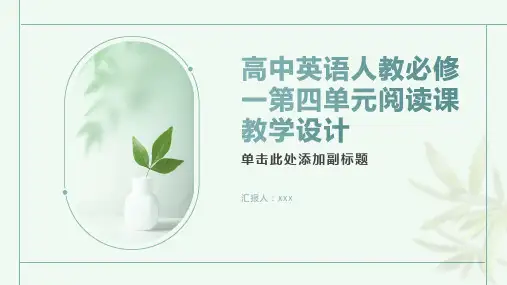
七选五阅读填空根据短文内容,从短文后的选项中选出能填入空白处的最佳选项。
选项中有两项为多余选项。
Passage 11 Being angry doesn’t really solve much,but what people do when they feel angry is important.The goal is to calm down and try to solve what is bothering you.This is hard for some kids and adults,too.Instead of calming down,some kids might keep getting more and more upset until they explode like a volcano!2 Their anger might be so strong that they lose control of their temper.They may act in ways unacceptable and hurtful.People may say that someone has trouble controlling their temper.3 Some kids might get so angry that they scream at their parents,break something,or even worse,hit their brothers or sisters.4 However,it’s not OK for a kid to do any of those things.Kids don’t want to act in this way,but sometimes angry feelings can be hard to manage.So what to do?Well,the good news is that kids don’t just have to keep making the same mistakes over and over again. 5 Imagine your temper as a puppy (小狗) inside you that needs some training.The puppy is not bad—it will probably turn out a great dog.It just needs to learn some rules because,right now,that puppy is causing some problems to you.A.You can train your temper.B.You don’t want to cause trouble.C.Kids should be allowed to express their feelings,even angry ones.D.Everybody gets angry sometimes.E.In fact,they usually mean that a kid behaves badly when feeling angry.F.Instead of thinking of the person you’re angry with,think of something else.G.Some kids get angry more often or more easily than some other kids.答案:1~5 DGECAPassage 2A major source of teen stress is school exams,and test anxiety is not uncommon.When you recognize your teen is under stress,how can parents help your teen stay calm before an exam?Be involved.Parents need to be involved in their teen’s work. 1 What they look for is your presence—to talk,to cry,or simply to sit with them municate openly with your teen.Encourage your teen to express his worries and fears,but don’t let them focus on those fears.Help them get organized. 2 Together,you and your teen can work out a time-table in which he/she can study for what he/she knows will be on the test.Provide a calm setting.Help your teen set up a quiet place to study and protect his/her privacy.Give them a nutritious diet.It’s important for your teen to eat a healthy,balanced diet during exam times to focus and do his/her best. 3 If this happens,encourage your teen to eat light meals or sandwiches.A healthy diet,rather than junk food,is best for reducing stress.4 Persuade your teenager to get some sleep and/or do something active when he/she needs a real break from studying.Making time for relaxation,fun,and exercise is all important in reducing stress.Help your teen balance his/her time so that he/she will feel comfortable taking time out from studying to spend time with friends or rest.Show a positive attitude. 5 Your panic,anxiety and blame contribute to your teen’s pressure.Make your teen feel accepted and valued for his efforts.Most importantly,reassure your teen that things will be all right,no matter what the results are.A.A parent’s attitude will dictate their teen’s emotions.B.Exam stress can make some teens lose their appetite.C.They will only make the situation worse.D.Encourage your teen to relax.E.The best thing is simply to listen.F.Help your teen think about what he has to study and plan accordingly.G.Your teen may also make negative comments about themselves.答案:1~5 EFBDAPassage 3There was once a lonely girl who longed eagerly for love.One day while she was walkingin the woods she found two starving song birds. 1 She raised them with love and the birds grew strong.Every morning they greeted her with a marvelous song.The girl felt great love for the birds.She wanted their singing to last forever.One day the girl left the door to the cage open.The larger and stronger of the two birds flew from the cage.The girl watched anxiously as he circled high above her.She was so frightened that he would fly away and she would never see him again that as he flew close,she grasped at him wildly. 2 She held him tightly within her hand.Her heart gladdened at her success in capturing him.Suddenly she felt the bird go soft.3 Her deadly love had killed him.4 She could feel his great need for freedom.His need was to fly into the clear,blue sky.She lifted him from the cage and set him free softly into the air.The bird circled once,twice,three times.The girl watched,delighted at the bird’s enjoyment.Her heart was no longer concerned with her loss.She wanted the bird to be happy.Suddenly the bird flew closer and landed softly on her shoulder. 5The fastest way to lose love is to hold on too tight;the best way to keep love is to give it wings!A.She opened her hand and stared in horror at the dead bird.B.She took them home and put them in a small cage.C.It sang the sweetest melody she had ever heard.D.The smaller bird flew away.E.She noticed the other bird kept in the cage.F.She found the other bird was not there.G.She caught him in her fist.答案:1~5 BGAECPassage 4Many people think of guys as being carefree when it comes to their appearance.But in fact,a lot of guys spend plenty of time in front of the mirror.They care just as much as girls do about their body image.Body image is a person’s opinions and feelings about his or her own body and physicalappearance. 1 You appreciate your body for its capabilities and accept its imperfections.2 Here are some ideas:Recognize your strengths.Different body types are good for different things.What does your body do well? Maybe your speed,strength,or coordination makes you better than others at a certain sport.That may be basketball,table tennis,mountain biking,dancing,or even running.Or perhaps you have non-sports skills,like drawing,painting,singing,playing a musical instrument,writing,or acting. 3 Exercise regularly.Exercise can help you look good and feel good about yourself.Good physiques (体形)don’t just happen. 4 A healthy habit can be as simple as exercising 20 minutes to 1 hour three days a week.Working out can also lift your spirits.Respect your body! Practising good habits—regular showering;taking care of your teeth,hair,and skin;wearing clean clothes and so on—can help you build a positive body image.5 Your body is just one part of who you are.Your talent for comedy,a quick wit (智慧),and all the other things make you unique.So try not to let small imperfections take over.e this as an opportunity to discover what you’re good at.B.Be yourself.C.Having a positive body image means feeling satisfied with the way you look.D.Just explore talents that you feel good about.E.They take hard work,regular workouts,and a healthy diet.F.The good news is that self-image and body image can be changed.G.So,what can you do to develop a positive body image?答案:1~5 CGDEBPassage 5Trust has been considered as the basis of any relationship,including friendship.No relationship can last long with a lack of trust.Not many of your friends will have real faith in you as you would like to believe. 1 Sometimes,it takes years,even a complete lifetime,to trust someone.However,how do we know if our friends have faith in us?2 With whom will you share things that you don’t want everyone to know? It would be with a close friend,whom you trust as much as you trust yourself.While a few of your friends may be fiercely protective of their privacy and may not tell their secrets to anyone,those who do,surely find you trustworthy and reliable. Whom do you look up to for advice when you need it the most? It has to be either your parents or your friends.3 This is a shining example of trust.You only seek advice from people you hold in high regard and find dependable.The friends who trust you will never forget to include you in the important decisions of their life. Arguments and heated discussions are a part of every relationship,and this is also true for friendship.4 While some people find it difficult to forgive and forget,your friends will never have problems moving on.It is because they trust you and believe that you will never cause any pain to them on purpose.There are times in life when you find yourself a lonely soldier. 5 Your friends will never let you down and will strongly stand for you when you need encouragement.You can determine that they trust you and believe in your beliefs,if they side with you when you need them the most.A.People can be extraordinarily jealous sometimes.B.You know they will never pass on a wrong suggestion.C.In fact,winning trust is,by far,the most challenging aspect of relationships.D.Two people cannot have identical reactions to a situation and different opinions do exist.E.No matter how close you are to your friends,you cannot take that comfort level for granted.F.If your friends share their secrets,there’s a good possibility that they have much faith in you.G.However,people who are fortunate to have been blessed with true friends are never alone in any battle.答案:1~5 CFBDG。
题型专项突破-Unit4阅读理解(自然灾难篇)阅读理解(共两节,满分40分)第一节(共15小题;每小题2分,满分30分)阅读下列短文,从每题所给的四个选项(A、B、C和D)中,选出最佳选项。
AEarthquakes are something that people fear. There are some places that have few or no earthquakes. Most places in the world, however, have them regularly. Countries that have a lot of earthquakes are usually quite mountainous(多山的).The most talked about earthquake in the United States was in San Francisco in 1906. Over 700 people died in it. The strongest one in North America was in 1964. It happened in Alaska.Strong earthquakes are not always the ones that kill the most people. In 1755, one of the strongest earthquakes ever recorded was felt in Portugal. Around 2, 000 people died.In 1923, a very strong earthquake hit Tokyo, Yokohama area of Japan. A hundred and forty thousand people died. Most of them died in fires which followed the earthquake.One of the worst earthquakes ever was in China in 1976. It killed a large number of people. The worst earthquake ever reported was also in China, in which 830, 000 people were killed. This earthquake happened in 1556.Earthquakes worry people a lot. The reason is that we often do not know when they are coming. People cannot prepare for them.(1)We can infer from the passage that.A.people are not afraid of earthquakesB.only strong earthquakes kill a large number of peopleC. a large number of earthquakes often happen next to mountainsD.earthquakes happen only in a few places along the coast(2) How many people died in the earthquake which happened in Portugal in 1755?A. 500.B. 140, 000.C. 830, 000.D. About 2, 000.(3)When and where was the worst earthquake ever reported?A.1964;Alaska.B.1556;China.C.1923;Japan.D.1979;China.(4)According to the passage, which of the following is NOT true?A.The stronger the earthquake is, the more people are killed.B.Earthquakes often come unexpectedly.C.Earthquakes can cause fires.D.People still don,t know when an earthquake will come.答案:(1)-(4) C D B A解析:(1)细节理解题。
Unit 4 Natural Disasters Period 5Reading for Writing教材分析该板块的活动主题是“写摘要”(Write a summary)。
要求学生在读完关于海啸的新闻报道之后,为单元主篇阅读编写摘要。
阅读文本是一则专题新闻。
文本语言属于即时性的新闻报道,表达准确、简明扼要,只讲述事实,不带感情色彩。
文章标题醒目,直接说明事件。
与简短的新闻报道不同的是,专题报道的文本更加丰富,如加入了当地居民和官员的话语,加强了真实感。
教学目标1. 能正确理解使用下列词汇与海啸新闻报道相关的表达。
2. 掌握新闻报道的摘要的语篇特征。
3. 学会写纪实性新闻报道的摘要。
教学重难点【教学重点】帮助学生掌握新闻摘要的写作特点和语言特色,完成摘要写作任务。
【教学难点】掌握新闻摘要的既高度凝练又表达有力的语言特色。
教学过程Step 1 Warming-upStudents watch the video Tsunami: Killer Wave. Then answer the following questions:(1)What is a tsunami?(2)What causes it?(3)Will it cause great damage to human beings?Step 2 Pre-writing1. Work on Activity 1. Read the news report released the day after a tsunami and answer the questions:(1) When did the tsunami happen?(2) What caused the tsunami?(3) Why would it be difficult to deliver food and supplies?2. Work on Activity 2. Read the summary of the news report. Then check the main points it includes.设计意图:复现有助于加深记忆。
Earthquakes说课稿曲靖市第二中学杨绍斌一、说教材1. 教材的地位及作用本节课的教学内容是高一英语必修1第4单元Earthquakes,内容主要涉及“中国唐山地震的不眠之夜”、“地震后重建的新唐山”、“地震的基本知识”、“地震中如何自救,救人”等内容。
本单元的语言知识和技能都是紧密围绕这一主题设计展开的。
通过本单元的学习,掌握如何表达过去的事情,让学生对地震有更多认识,加强自我保护。
2. 教材结构、内容及教材设计意图本节课主要处理三个部分:读前、阅读和理解。
“读前”(Pre-reading)部分设计了两个有关地震方面的问题让学生回答。
第一个问题是让学生设想一下:如果地震发生的瞬间你在离开住房之前只来得及带走一样东西,你要带什么,为什么要带这件物品?第二个问题是让学生看图回答地震前夕动物和自然界奇特的异常变化。
此题与“理解”(Comprehending)部分的内容密切相关。
“阅读”(Reading)部分题为“地球的一个不眠之夜”,是叙述1976年7月28日凌晨发生在河北省东部唐山市的大地震。
全文分成四段:第一段讲地震前夕,唐山地区发生的一系列反常的现象,这些“怪事”其实都是地震前的预兆,可惜在当时并没有引起人们的注意和警觉。
第二段讲20世纪最大的一场地震就在唐山市发生了,短短的15秒钟,地震就几乎把整个城市夷为平地,伤亡人数达到40多万!第三段讲地震后城市一片凄惨,紧接着下午又发生了一次强烈的余震,幸存者感到悲哀的同时又产生了惊恐与不安。
第四段讲在解放军的救援和全国各地的支援帮助下,被地震摧毁的城市又开始得以恢复。
“理解”(Comprehending)部分设置了5个练习,主要用来帮助学生更好地理解阅读课文的内容。
练习1要求学生根据课文内容将练习里的相关句子正确配对。
这个练习主要是检查学生对课文中的某些细节内容的理解情况。
练习2要求学生结合课文的内容按照时间顺序列出唐山地震前后发生的事情。
练习3要求学生归纳课文的段落大意。